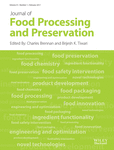Comparative Study on Virgin Coconut Oil Extraction Using Protease from Hepatopancreas of Pacific White Shrimp and Alcalase
Abstract
Virgin coconut oil (VCO) was extracted from coconut milk with the aid of crude protease extract (CPE) from hepatopancreas of Pacific white shrimp at different levels (5–15 unit/g protein) at 60C for various hydrolysis times (0–180 min). Yield of VCO increased within the first 90 min (P < 0.05). However, Alcalase showed higher efficacy in VCO extraction, compared with CPE and the control (without enzyme) (P < 0.05). No differences in lipid oxidation of all VCOs extracted by different proteases were observed (P > 0.05). Alcalase and CPE increased the creaming index and induced the collapse of oil droplets in coconut milk, as determined by the confocal laser scanning microscopy and the phase contrast microscopy. VCOs contained medium chain fatty acid, especially lauric acid (C12:0), as the most abundant fatty acid, followed by myristic acid (C14:0). Therefore, VCO could be extracted using CPE or Alcalase at the optimal temperature (60C) for 90 min.
Practical Applications
Pacific white shrimp hepatopancreas has been known as a potential source of trypsin that can be used to hydrolyze proteins stabilizing emulsion in coconut milk. Trypsin from Pacific white shrimp hepatopancreas could therefore serve as a potential aid for virgin coconut oil extraction with the shorter processing time, particularly when applied under the optimal condition. As a consequence, the cost associated with commercial enzymes could be reduced and the prime quality of virgin coconut oil was still obtained.




